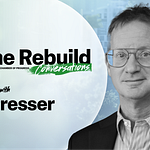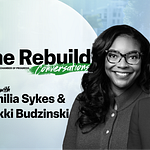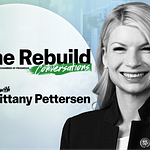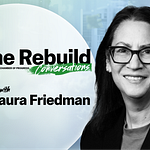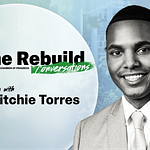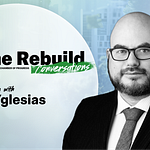Tahra Hoops: Hi everyone. Welcome to The Rebuild. I'm one of your hosts, Tahra Hoops, joined by Gary Winslett and today we have a very special guest joining us: Representative Josh Harder. He is a Democrat from California, serving Modesto and parts of the Central Valley. Harder has served in Congress since 2019 and has become a key voice in the abundance conversation.
We're very excited he's joining us today. Rep. Harder, welcome to The Rebuild.
Rep. Harder: Thank you. Thank you so much for having me.
Tahra Hoops: Of course. So one of the first questions I wanted to ask you was about your newly launched bipartisan Build America Caucus. You framed it as a Get Things Done coalition for major projects. You said it's about breaking through bottlenecks that keep everything from new roads, clean energy to housing tied up for years.
For a lot of people, that's an abstract problem for them until they start to see delays in their own communities like highway expansion stuck in review. Can you walk us through the moment you decided "wow we need a whole caucus to fix this" and do you think this will change culture in Congress from debating projects to actually delivering on them?
Rep. Harder: I certainly hope so. I think a lot about the famous story of Boris Yeltsin visiting the United States at the height of the Cold War in the 1980s. He met with Bush, Reagan… went to the White House. He had a lot of exciting things to do, but nothing made a bigger impression on him than visiting an American supermarket and seeing what American growth and prosperity represented... a huge contrast to the shortages and the food lines that he was seeing in the Soviet Union at the time.
People sometimes say that communism fell when Boris Yeltsin first visited that American supermarket. I think today if somebody from Russia or China were airdropped into San Francisco or New York, they'd frankly be pretty underwhelmed compared to what they're seeing back home. We still have great supermarkets, but we have a housing and homelessness crisis. We're paying sky-high rates for electricity because we've made it tough to build solar and wind. We've waited 30 years for high-speed rail in California, and we still haven't gotten it. And so the goal of this caucus is trying to achieve that same wow moment for American growth and prosperity that we had in contrast to our international rivals only a few decades ago.
Gary Winslett: I actually wanted to ask you about that because I also love Boris Yeltsin Day. It's amazing. It comes around every year… I think it's in March. It's just fantastic. It’s the way you brought that up that made me think about this famous chart from AEI where you've got all these lines that are moving over time and the things that get cheaper at the bottom, like TVs and toys… it's stuff you can buy at the store or on Amazon or wherever. But then there's all these red lines of everything that gets more expensive, whether it's housing or hospital services. And so I just wonder what are your thoughts about why some of these things are getting so much more expensive, even while some basic consumer goods like TVs are cheap now?
Rep. Harder: I think there's a lot of takeaways from that chart which I do agree is pretty powerful as a way to both acknowledge that yes, technology has brought us superconductors or supercomputers that are in our pocket with our cell phones, cheap TVs, even cheaper and better cars… but has led to more expensive education, more expensive healthcare, and of course housing.
I think there's probably two takeaways: one is that as countries get richer, services become comparatively more expensive than products and that's why service-intensive industries like healthcare and education have gotten comparatively tougher. But then also, and this is the point that AEI itself tries to push folks to with that chart, is certainly that we have overregulated some sectors and not allowed enough innovation and competition. We've seen some great improvements in healthcare delivery over the last couple years, but ultimately I don't think anybody would say the American healthcare system is a model that folks should use across the rest of the world.
And on education we've been falling behind and one of my real regrets is that the intentions we had in the education reform movement decades ago have really died off, and we're not seeing any success except for a handful of states that have looked at phonics in really interesting ways like Louisiana.
There’s just not that same impulse towards trying to think about what education should look like for the 21st century. So we've got a lot of work to do to try to fix that chart and to try to make sure that folks actually have that prosperity and success that they deserve.
Gary Winslett: Yeah, for sure. I think it was interesting that you brought up both healthcare and education at the same time because we're both dads, and so I always think of these things as linked. How do I make sure my daughter's healthy and getting educated well at school? And I know you're part of this New Dads Caucus in Congress to highlight challenges men and dads face.
It's no secret that Democrats performed poorly last year among male voters and have been doing that for a while, so I would just love to hear you say a little bit more about how Democrats can do better with men in the midterms, but also in the long term trajectory. Is that focusing on Trump's tariffs and it making everything at Home Depot more expensive or is it cuts to Medicaid?
What are some of your thoughts on this?
Rep. Harder: I don't think politics is all that complicated. I think folks try to slice and dice voters in lots of different ways... but I think it ultimately comes down to only one question, which is who's gonna fight for you? And I think voters in 2024, all too often, and especially in my district, did not hear about a Democratic Party that was actually going to stand up on the issues that they cared about most.
Trump won my district, but I also got elected, right? Tens of thousands of people who voted for Donald Trump for president put my name down just a couple names down on their same exact ballot. A lot of those crossover voters told me that they did it because they just believed a lot in the promises of Trump.
But they also understood that we were gonna highlight the issues that were most concerning to them... chief of all... affordability. Voters tell us in surveys and anecdotally that they heard more about trans kids in sports from Democrats in 2024 than they heard about what we're gonna do to make housing more affordable and healthcare better.
That is not a way to win anywhere across the country, especially in a place like the Central Valley where the economy is always the first and second issue. So I don't think it's gonna be as easy as saying, "oh, this is the strategy we're gonna do to win back men, win back dads, win back young people," ultimately I think most folks share a lot of the common concerns and the issues that are most important to them and over the last couple years it has been affordability first, second, and third and the Democratic Party, I don't think, has presented enough answers to those questions.
Tahra Hoops: We agree with you completely on that. That's something Gary and I have been shouting from the rooftops since before the election that it was a cost of living election. But we were not having those conversations, and you're seeing it now in smaller races pop up where affordability continues to be the number one thing, and the Democrats are having an issue, as Gary mentioned, with reaching younger men, but also younger people as a whole.
I think young people are just stuck in a generalized malaise of fog, of thinking everything sucks all the time. I'm never going to be able to own a house. I'm 26. The idea of owning a house seems like a pipe dream. It just feels so far away 'cause I also live in California and I see these prices happening.
And that's something I did like about the book Abundance, where you read through it and it feels like just listing every single thing wrong with the country… but I closed that book and I felt excited because we were actually getting specific on what issues need to be resolved, and then that I found to be the first step to talking about solutions.
So I wanted to ask you, you've already called it... it is the cost of living issue, it's the affordability issue… but how can Democrats get better at messaging when it comes to focusing on the solution aspect of it?
Rep. Harder: I think that's really powerful and I think one thing that's really important is to make sure that nothing speaks louder than reality itself. Life should be better for people in states run by Democrats and all too often the opposite is true. California and New York and Massachusetts and Illinois should be shining beacons of how great life looks like when you elect Democrats. And it doesn't, right? All too often these are cautionary tales. President Trump campaigns on how bad homelessness is in California, and a lot of people in my district and across our state agree with him. We may not agree with his solutions but we certainly agree that it's a huge problem that doesn't get enough progress from Sacramento.
I think obviously a big piece of that is that folks like to live in California. We have a lot of demand for housing but obviously we haven't built that supply. And so a huge piece of what we're trying to do to fix it is trying to make sure that we have a real outcome mindset towards trying to deliver the goods that people desperately need.
Chief among those: energy, healthcare, housing, infrastructure. And hopefully if we can get that right or at least start moving in that direction, we can start actually running for Congress or for President in the Democratic Party and say, We want more states to look like these shining beacons of growth and prosperity that we have in states like California and New York,” because it's hard running in a purple district, in a district that Trump won, saying “We want more folks to look like California,” because a lot of folks think differently.
Editors Note: Unfortunately we had some technical difficulties and Tahra was disconnected. From here on out the conversation is between Representative Harder and Gary. Sorry about that.
Gary Winslett: So I wanna follow up on that though, because sometimes you have to tell people no. There’s a line I heard recently which is that Texas isn't good at building housing... it's bad at letting people block housing. And in California that's part of the problem. If you want to build new housing, I've seen the local board meetings, people, local officials who want to build new housing, get screamed at by constituents who don't wanna see any new traffic around them.
It's tough, I get it. People like their neighborhoods, they're proud of them, and so change feels scary. I just wonder…What do you think about getting past these oppositional parts that stand in the way of housing or infrastructure or whatever it is?
Rep. Harder: I think one of the things that we found is that, yes, there certainly is a tyranny of the minority and that the folks that show up at those meetings are unrepresentative. And also even if they are representative, they're representative of the folks that already live in a particular area, let alone all the people that desperately wanna be able to afford that [area].
We found that the larger the scope of the solution, the easier it is for folks to understand the benefits to them. And so if you're only looking at a particular city block and everybody's going to see the construction costs in terms of the noise and the congestion and all the rest and then one family's gonna get that benefit, that city block is probably going to be the most opposed.
But if you scale it up to a larger city, or to a county, or to a state, or to the federal government… it's much easier to actually get political support for increasing housing supply because the costs are so much more disparate across the entire population and the benefits are actually more widely held as well because it's not just one family that's actually getting that cheaper housing cost that's actually available for everybody.
And so if you buy that model then the federal government should actually be one of the greatest champions for increased housing supply across the country. And it's understandable why city councils and local city council members would be under such pressure to block one particular house in one particular housing project because their constituents are gonna feel the burden the most. The federal government should be in the opposite boat. And one of the things we're trying to do here in this caucus is trying to be able to aggregate those benefits and trying to make sure that we're all uniting the pro-growth parts of the Democratic Party.
There are elements of the Democratic Party that are anti-growth, just like I think there are a lot of elements in the Trump Administration and the Republican party right now that are pushing against American growth and prosperity.
But, we need a party that is actually moving towards the future.
Gary Winslett: No totally agree with that. It's interesting that you brought up sort of the federal government leaning into sort of YIMBYism, if you will. I know you're on the House side, not the Senate, but the Senate just had this ROAD to Housing bill that got through the Senate Finance Committee 24-0. I'm really hoping that there's a House companion that that's gonna be...
Rep. Harder: We're working on it. We're working on it. Absolutely. A great move forward, obviously, to see Tim Scott and Elizabeth Warren... not exactly folks that you obviously think of as close ideological allies working together on something. I think [it] shows how far we've come. It's about time that the federal government started moving on YIMBY policy.
We've seen some real gains at a state and local level, which is fantastic. We had Kamala Harris run for President on that agenda. She only had one really new policy idea, obviously a very short campaign, it was on creating 3 million new additional housing units. I thought it was really exciting that we had a [presidential candidate] actually talking about housing supply for the first time ever, but I was incredibly disappointed at the actual policy specifics.
Underneath that talking point, which I think most outside observers recognize, would create very few additional housing units if any. And I see us as at a real inflection point here where it's clear that housing costs are a major problem for everybody but we still don't have enough progress on the ideas to actually accelerate housing supply.
So I agree: the Senate bill is a great start. We have a couple ideas in the House that I could talk through, but I'm all for an “all of the above” approach. We have to just make sure that the federal government is doing more to make housing affordable for people.
Gary Winslett: That's great! I could talk to you about housing all day, but I do wanna actually move on to infrastructure. A lot of people when they think about infrastructure, they immediately think highways and bridges, but there's all kinds of other infrastructure that we need too.
It might be water, it might be electricity lines… What do you think is the biggest hurdle here? Is it permitting? Is it workforce? Is it something else? What is actually getting in the way of building infrastructure the way we need it?
Rep. Harder: I think it is at the very foundation [of] the philosophy of how we actually build infrastructure across the United States. This model of sort of... design... bid... build... that can take decades for these mega projects and is just structurally flawed at the very beginning. One important point that a lot of people bring up, [which] I think is really important to just talk about, is that other countries that face similar environmental and labor protections, if not even higher than the United States, build infrastructure much more affordably. You can look at the expansions of the Paris Metro versus the Second Avenue Subway. We're talking about $2.2 billion per kilometer in New York City to build versus $230 million… a 10th of the cost in Paris, and I don't think anybody will tell you that France is not a country that believes in environmental and labor protections. So I really think this is a structural problem.
There isn't one silver bullet we're gonna be able to fix…What we need is more experimentation. We need to be able to double down on projects that actually get it right. We need more accountability and ultimately I think we just need to make sure that we are keeping folks focused on those outcomes, which is making sure that the infrastructure gets built and not in the decades and thousands of pages of paperwork that end up keeping us from the process…because it's pretty embarrassing to me as an American that Europe is doing this better than we are. We have to figure it out.
Gary Winslett: No I think that's right. I remember seeing an infographic on, I believe it was outta Seattle, how long it took to build a bike lane. And it was just unbelievable. It was a six year process to build a bike lane. This isn't even a high tech, super expensive thing and it was just layer after layer of process. It just made no sense.
Rep. Harder: My favorite example here is the city of Pasadena, which recently [is] working to underground all of their power lines in the city because of wildfire risk... makes a lot of sense.... a great thing to do. They just sent out an estimate to the city on how long it's going to take. It's not gonna take them five years to do this or even 50 years, they told the city residents that it's going to take them 500 years to put power lines underground across the entire city. That's their project timeline, right? That sounds completely laughable. But that's the state we're in. Think about how much credibility you lose walking in front of somebody and saying, “we're absolutely gonna fix this pothole in front of your street. We're gonna fix this problem for you. It's just gonna take us 500 years to get it done.”
Gary Winslett: I want to ask you some of the questions we like to ask everybody, which are a couple rapid fires. The first is something you think is too expensive. So I just recently bought a house. We get to move in a couple weeks, which we're really excited about. But the closing costs were insane. Like the actual not even going into equity, but just like you pay almost what a basic car would cost in terms of taxes and fees and this and that, and it's just incredibly expensive. And in a way that's hard to explain. And I just wonder what is something that you think is too expensive?
Rep. Harder: Everything... but at this moment, especially energy prices. PG&E the local utility in Northern California, has doubled its prices over the past 10 years, and there are seniors across our area who are paying more in their AC bill every month than they're paying in their rent or their mortgage. Some folks are paying a thousand dollars or more just to keep the lights on and the air conditioning running.
And that is the clear result of the fact that we have not actually fixed generation, transmission.. and trying to make sure that probably one of the most essential needs for folks is affordable. [The] impact that has on economic growth cannot be overstated. When we're looking at technology developments and artificial intelligence, one of the biggest risks that we have moving forward on AI is that electricity is way too expensive and it's way too tough to build those projects.
That is a direct result of federal policies that have made it more complicated and tougher to actually get these projects built. And over the last couple months under the Trump Administration, it has actually, unfortunately gotten worse.
Gary Winslett: When the Trump Administration was taking over I had a hope that self-interest would actually beat out culture wars. There was so much money going to red districts for solar and wind, I hoped that they would be, verbally or rhetorically anti those things but still leave some of the projects in their current state, and it's been really disappointing to see them put culture war stuff even ahead of their own constituents’ electricity bills.
Rep. Harder: Yeah I agree. The disconnect between reality and rhetoric is huge. We have heard a lot about American energy dominance and independence from this Administration, where the results are exactly the opposite. Not just taking money away from solar and wind projects, but actually requiring the Secretary of the Interior to certify a lot of these projects, creating more process and more red tape when they've said they're trying to do exactly the opposite.
Ultimately it's just going to result in higher bills for folks.
Gary Winslett: Another one I wanted to ask you about is innovation that you think is overrated.
So one of the ones that drives me crazy is it seems like all the Gen Z kids today watch their videos with words on the video and it just drives me absolutely nuts. And so I'm just curious, what's an innovation that you think is overrated?
Rep. Harder: Frankly, the doom scrolling videos that I think almost all kids are addicted to. The entire social media era had so much promise and has resulted in, I think, so many costs. I, as a dad of two kids, think a lot about how to be intentional about their technology use which I think is just gonna be harder as they grow up.
But the root issue of it is we have gotten really good at giving folks those dopamine hits through social media. And I think we probably need some public policy as well as all of the phone bans in schools and the rest which are moving forward in many school districts, to try to make sure that we're freeing folks back up because people that do it often regret the fact that they have done it and that I think is a real loss.
Gary Winslett: I also wanna ask you about policies or innovations that you think are underrated. I drive a Subaru and there's this cool computer system in my car where if I'm sliding in the snow in Vermont in January, it'll take over so you don't slip and slide everywhere. It doesn't kick in too often, but every now and then it'll happen going downhill in the snow. It'll just straighten you out real quick. It's this dynamic control system and I just think it's amazing. I'm just curious, what is a policy or invention or innovation that you think is underrated?
Rep. Harder: Something that I'm really excited about that I don't think most folks really appreciate is how important clinical trials are for American innovation. It's great that we have these GLP-1's, Ozempic and the rest that are now on the market, but we make it really hard to test cancer and Alzheimer's drugs that can prolong people's life and improve their health, and this is a real problem.
We're having great science done in labs, but it can be really hard to actually translate that into medical breakthroughs that can help. People live the lives that they need. And one area that I am really working on that I'm optimistic will be very bipartisan, something I actually agree with some of the things the Trump Administration has set on, is that we need to make this process of testing new medicines much cheaper, much faster.
And I think we can do that... especially given some of the drug discovery developments that are happening with artificial intelligence and technology...we have an opportunity to really prolong people's health and make their lives much better if we can get this right. But if we can't, then the bottleneck of actually testing this is just going to overwhelm our ability and we're not gonna be able to actually have those real breakthroughs that people need.
Gary Winslett: I totally hear it. I remember during the COVID-19 pandemic I was signed up with this thing called One Day Sooner, and a bunch of us who had volunteered basically to be the guinea pigs because if you could get these vaccines on the market even one day sooner, that would save thousands of lives.
And we just all got told no. Even though we were healthy young adults, really wanted to help out in whatever way we could, thought that these things were probably safe but were willing to be like the first wave of it, we just weren't allowed. And I just remember that being very frustrating. So yeah I'm totally with it on the clinical trials.
Rep. Harder: I think the FDA puts its credibility at a very high level, which is important. You wanna make sure that people have trust. That when the FDA says something is safe, that everybody accepts it. But there needs to be more progress here because this bottleneck is costing us a ton of money.
People don't realize how much progress China has made on biopharma. It's a huge portion of their inputs. And even countries like Australia do clinical trials at the exact same safety standards as in the United States for a fraction of the cost at much greater speed. So we can learn a lot from other countries here.
And a big piece of it is making sure that folks actually have an incentive to actually join these clinical trials and try to discover if these drugs can actually work. Because if they can, it'll be better for all of us.
Gary Winslett: Totally agree. Okay, last question because I know we're running out of time. I wanted to ask you about your favorite sort of unusual or unorthodox policy idea. So one that I have on this is Pat, do you know what Patriots Day is?
Rep. Harder: No.
Gary Winslett: It's the third Monday in April in Boston, Massachusetts, the whole state, and it's always when they run the Boston Marathon, and it's a state holiday and it commemorates the battles of Lexington and Concord that started the Revolutionary War.
I would love to see that turned into a national federal holiday because we have this long stretch from President's Day in February, all through Memorial Day with no federal holidays. And so Patriots Day in April would just be a primo three day weekend for the spring. So I'm just curious, do you have any of these other kinds of unusual policy ideas?
Rep. Harder: When I was a kid I actually wrote an op-ed for my school newspaper about how we should abolish summer vacation and actually just give everybody three-day weekends…year round…so very similar. My teachers hated it because they all got second jobs over the summer to make extra money.
But to me, you actually get sick of the summer in the last month or two, right? You're enjoying it, you have fun, but it gets a little bit boring over time versus a three day weekend you enjoy every single week. It's better to have a little bit less time and you'd be more focused during the four days that you actually have school or for work.
So obviously not good for all parents, but I think it would be a game changer for kids that sit the last couple weeks of summer vacation and feel like they have nothing to do.
Gary Winslett: Yeah I think that's great. Congressman, thank you so much for your time. It was great having you on today. We really appreciate it.
Rep. Harder: Thank you. Thanks for all the work you do.
Gary Winslett: Yeah, have a great day.






